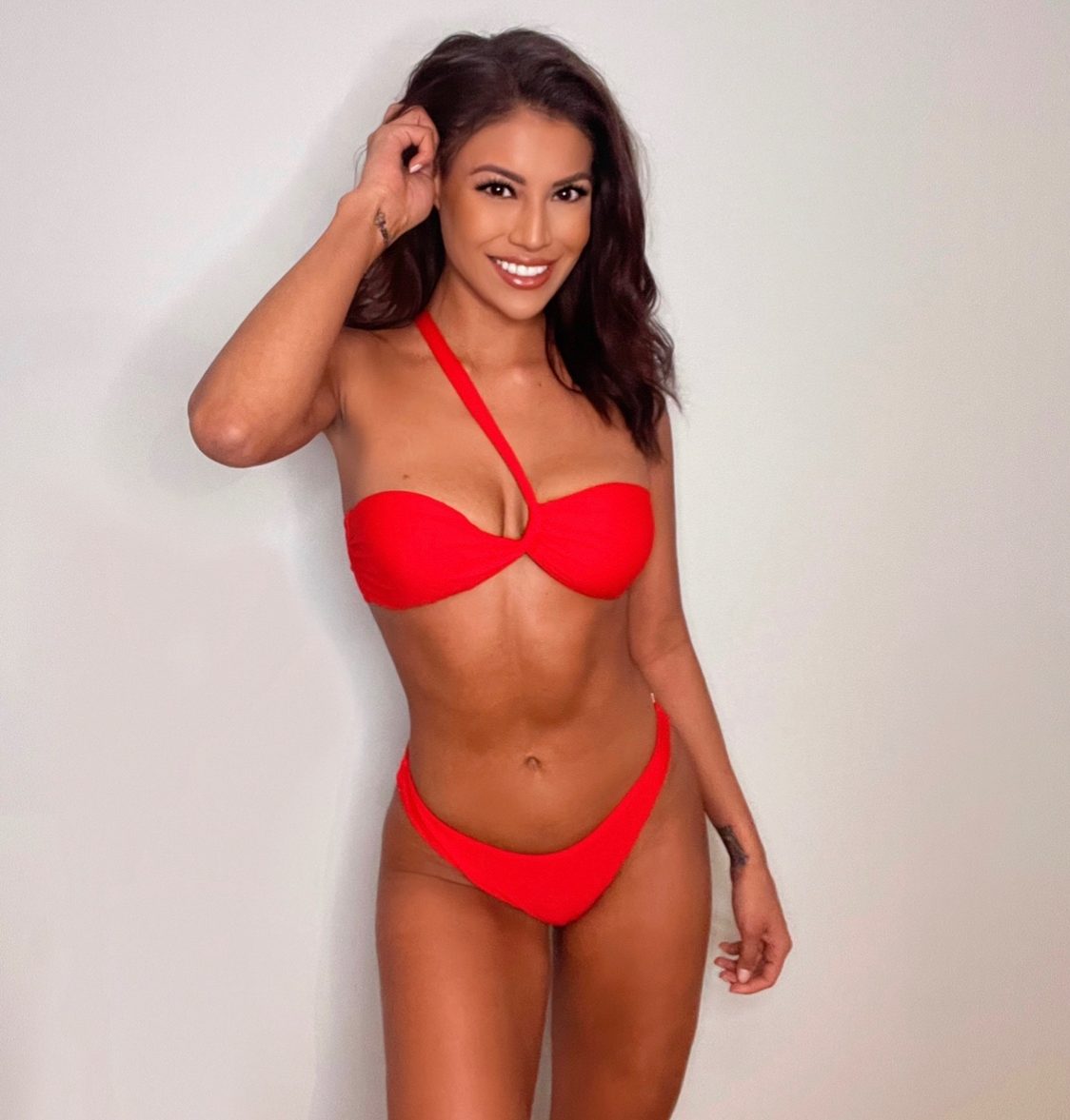By Emily Mertz Global News
Updated March 11, 2022

Ashley Callingbull has been selected to model in this year’s Sports Illustrated magazine swimsuit edition — the first Indigenous woman to be featured.

READ MORE: Alberta-born Cree model becomes face of Nike campaign: ‘Breaking some glass ceilings’
“I got the call at 6 a.m. I was still in bed. I couldn’t believe it,” Callingbull said in an interview with Global News from the Dominican Republic Thursday night. “I thought I was actually dreaming… I just started crying.
“And then finding out I’m the first Plains Cree First Nations woman — wow. It’s just still so surreal to me. I’m still in shock. I’m just so proud.
“It’s breaking a lot of barriers but it’s also opening a door for other Indigenous women to follow so that they’re comfortable in this space and they feel that they can shine here,” she said.
“Being the first is great but knowing that I’m not the last is the most important thing for me.”

Ashley Callingbull, from Enoch Cree Nation, will become the first Indigenous woman to be in Sports Illustrated Swimsuit edition. Courtesy: Ashley Callingbull
The model and advocate, who is from Enoch Cree Nation, just west of Edmonton, is also the only Canadian in this year’s Sports Illustrated swimsuit edition.
“It’s really exciting and I hope Canada is there for me to vote and support me,” she said, explaining the cover model will be chosen through a vote.
“I want to represent my people and I want to represent my country,” Callingbull said
In her meetings with the magazine, Callingbull said Sports Illustrated was looking for more than models for this edition.
“They’re looking for women who are not just diverse, but that have these powerful platforms and do so much work on their own. It’s not just modeling; it’s about how you can use your voice, how you can amplify other women’s voices and what good you can bring to the world.”
Callingbull shared her upbringing included domestic violence and poverty. That inspired her to help women and children escaping abuse and she’s partnered with WIN House on several projects. She also works with at-risk youth in the foster system.
Being featured as a proud, independent Indigenous woman in such a well-known magazine is a way to highlight a population that often is ignored or silenced, Callingbull said.
“Indigenous women, we’re always considered a target,” she said. “People see us ‘less than’ and now… everyone knows what Sports Illustrated is… I’m in this position where I can use my voice (to) create change.
“It’s so crazy to think where I came from. I was this really insecure Native girl that didn’t even dare to dream because there was no one out there chasing the same dream. Now I’m signing contracts that say ‘Sports Illustrated’ on the top of it. I just can’t even comprehend it yet.
“It makes me so excited because who else is going to be doing this after me… There’s going to be more individuals chasing these dreams.”

The model and advocate, who is from Enoch Cree Nation, just west of Edmonton, is also the only Canadian in this year’s Sports Illustrated swimsuit edition.
“It’s really exciting and I hope Canada is there for me to vote and support me,” she said, explaining the cover model will be chosen through a vote.
“I want to represent my people and I want to represent my country,” Callingbull said
In her meetings with the magazine, Callingbull said Sports Illustrated was looking for more than models for this edition.
“They’re looking for women who are not just diverse, but that have these powerful platforms and do so much work on their own. It’s not just modeling; it’s about how you can use your voice, how you can amplify other women’s voices and what good you can bring to the world.”
Callingbull shared her upbringing included domestic violence and poverty. That inspired her to help women and children escaping abuse and she’s partnered with WIN House on several projects. She also works with at-risk youth in the foster system.
Being featured as a proud, independent Indigenous woman in such a well-known magazine is a way to highlight a population that often is ignored or silenced, Callingbull said.
“Indigenous women, we’re always considered a target,” she said. “People see us ‘less than’ and now… everyone knows what Sports Illustrated is… I’m in this position where I can use my voice (to) create change.
“It’s so crazy to think where I came from. I was this really insecure Native girl that didn’t even dare to dream because there was no one out there chasing the same dream. Now I’m signing contracts that say ‘Sports Illustrated’ on the top of it. I just can’t even comprehend it yet.
“It makes me so excited because who else is going to be doing this after me… There’s going to be more individuals chasing these dreams.”

Ashley Callingbull, from Enoch Cree Nation, will become the first Indigenous woman to be in Sports Illustrated Swimsuit edition. Courtesy: Ashley Callingbull
Lisa Weber, president of the Institution for Advancement of Aboriginal Women, said Callingbull serves as a great role model. She’s setting goals and pursuing them and sharing that journey, Weber explained.
“It sends a very strong message and moves the bar forward in terms of breaking commonly what have been myths and stereotypes of Indigenous women.
“It really speaks to her confidence,” Weber added. “She’s a very talented young lady and this is an opportunity to really influence society’s perception of Indigenous women and their skills, abilities and talents.”
READ MORE: First Nations woman from Alberta crowned Mrs. Universe 2015
She stressed the importance of changing the status quo and challenging stereotypes.
“All of us, in our own ways, can take steps to address such barriers in society and I think this step by Ashley certainly contributes to that goal,” Weber said.
“It’s very significant for other Indigenous women and girls to see you set a goal, pursue it, and then anything is possible.
“We are making great strides in all kinds of fields and professions and I think it’s past time to accurately portray that.”
READ MORE: Canada is asking families of murdered, missing Indigenous women to wait for action plan. Why?
Callingbull started modeling in Edmonton when she was 18. Her first gig was Western Canada Fashion Week.
“I got encouraged to keep pushing myself and I thought it was really important to put myself out of my comfort zone to see what I’m made of. Now I’m fearless and I’m thriving and I’m manifesting my dreams.”
She said she’s proud of her background and wants to share it with everyone.
“It feels amazing to be representing my band — Enoch Cree Nation — representing Alberta and then representing Canada… It’s a really big deal. I feel really honoured.”

Lisa Weber, president of the Institution for Advancement of Aboriginal Women, said Callingbull serves as a great role model. She’s setting goals and pursuing them and sharing that journey, Weber explained.
“It sends a very strong message and moves the bar forward in terms of breaking commonly what have been myths and stereotypes of Indigenous women.
“It really speaks to her confidence,” Weber added. “She’s a very talented young lady and this is an opportunity to really influence society’s perception of Indigenous women and their skills, abilities and talents.”
READ MORE: First Nations woman from Alberta crowned Mrs. Universe 2015
She stressed the importance of changing the status quo and challenging stereotypes.
“All of us, in our own ways, can take steps to address such barriers in society and I think this step by Ashley certainly contributes to that goal,” Weber said.
“It’s very significant for other Indigenous women and girls to see you set a goal, pursue it, and then anything is possible.
“We are making great strides in all kinds of fields and professions and I think it’s past time to accurately portray that.”
READ MORE: Canada is asking families of murdered, missing Indigenous women to wait for action plan. Why?
Callingbull started modeling in Edmonton when she was 18. Her first gig was Western Canada Fashion Week.
“I got encouraged to keep pushing myself and I thought it was really important to put myself out of my comfort zone to see what I’m made of. Now I’m fearless and I’m thriving and I’m manifesting my dreams.”
She said she’s proud of her background and wants to share it with everyone.
“It feels amazing to be representing my band — Enoch Cree Nation — representing Alberta and then representing Canada… It’s a really big deal. I feel really honoured.”

Ashley Callingbull, from Enoch Cree Nation, will become the first Indigenous woman to be in Sports Illustrated Swimsuit edition. Courtesy: Ashley Callingbull
And, while being the first carries a weight, Callingbull feels the pressure is worth it. Representation matters, she says.
“I’ve had to be really strong, but once I’m walking through these spaces, I just want other Indigenous people to feel comfortable. I don’t want them to go through the same barriers and the same things — people telling them they don’t belong, they don’t belong here — the racism.
“Me, just standing here strong, as an Indigenous woman in a space where no one has been before, it’s monumental.”
Callingbull said the Sports Illustrated opportunity is “life-changing.”
“From that little girl I was before, I would have never even dared to dream that this was possible. To know that this moment is here now, it gives me the chance to let other little girls know that yes, the dream is possible. It can happen.
“When they see my face, they’ll feel represented and they’ll feel beautiful and be proud of their skin colour and their background and it’s something to never be ashamed of.”
And, while being the first carries a weight, Callingbull feels the pressure is worth it. Representation matters, she says.
“I’ve had to be really strong, but once I’m walking through these spaces, I just want other Indigenous people to feel comfortable. I don’t want them to go through the same barriers and the same things — people telling them they don’t belong, they don’t belong here — the racism.
“Me, just standing here strong, as an Indigenous woman in a space where no one has been before, it’s monumental.”
Callingbull said the Sports Illustrated opportunity is “life-changing.”
“From that little girl I was before, I would have never even dared to dream that this was possible. To know that this moment is here now, it gives me the chance to let other little girls know that yes, the dream is possible. It can happen.
“When they see my face, they’ll feel represented and they’ll feel beautiful and be proud of their skin colour and their background and it’s something to never be ashamed of.”
No comments:
Post a Comment